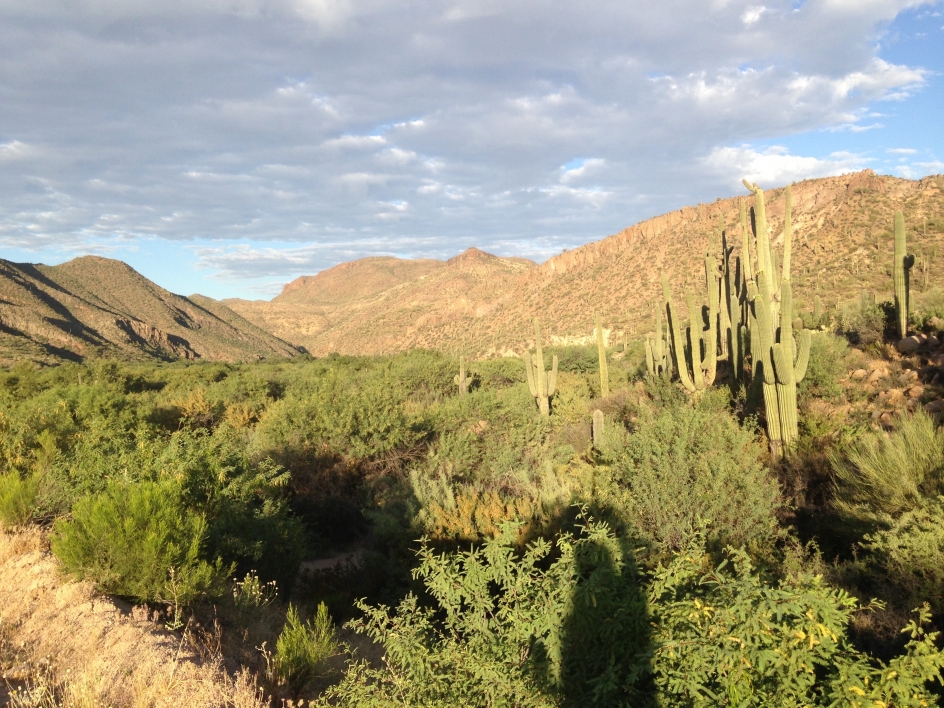Study: Climate change disrupting stability in desert stream ecosystems

An isolated pool in a drying stream. Photo courtesy of Nancy Grimm
A 35-year dataset from the central Arizona desert stream, from 1985 to 2019, has provided striking insights into the far-reaching impacts of climate change on the stability of stream communities.
Arizona State University Regents Professor Nancy Grimm has co-authored an article in PNAS that analyzes the decades of data collected in Sycamore Creek, Arizona, along with Xiaoli Dong, assistant professor at the University of California, Davis; Sharon Lawler from UC Davis; and Junna Wang, a postdoctoral scholar at Yale University.
Grimm, who is also a Virginia M. Ullman Professor of Ecology at ASU's School of Life Sciences and a senior global futures scientist, has dedicated most of her career to investigating climate change interactions, human activities, resilience, and biogeochemical processes in urban and stream ecosystems.
“Just as many of us prefer to have a relatively stable life, we would also like ecosystem functioning and services affecting human well-being to be relatively stable over time. … Our study contributes to our understanding of how and why certain natural communities will be destabilized under future climate change,” said Wang, first author on the study.
“Putting all the data together, we found that both changing climate and reorganized species interactions contributed to the reduced community stability,” Wang said.
This study provides strong evidence that climate change has weakened the community mechanisms that historically stabilized an ecosystem. With the emerging warmer and drier climate, new species might thrive while others might disappear, leading to an overall biodiversity loss and a cascade of destabilizing factors.
“The main point (of the article) is that we are already seeing major effects of climate change on the stream biotic community, largely because higher temperatures are causing more stream drying and changing the thermal regimes experienced by those organisms,” Grimm said.
It has been known that the stability of ecosystems largely depends on the species that live there. When the environment fluctuates, these communities respond in asynchronous ways. For example, using compensatory dynamics, a decrease in the abundance of one species will cause an increase in the abundance of another species, maintaining overall community stability.
However, researchers found that the increase in air temperature combined with a multiyear drought has caused a stark shift in the overall stability of the communities, and they have become increasingly sensitive to climate variability.
“One result that I was surprised by from this study is that a mere one-degree change in air temperature has caused such a drastic change in the dynamics of invertebrate communities in the stream,” Dong said.
The Sycamore Creek channel. Photo courtesy of Nancy Grimm
So far, these adverse effects of climate change have caused a decrease in the variety and numbers of important species, especially top predators. It can lead to a lasting impact on the makeup of the community in the years that follow.
"While our results convincingly show that the community dynamics has changed significantly in the recent decade, compared to the historical period, with even such long-term datasets, it is still hard to predict what the system will look like in the future with ongoing climate change,” Dong said.
“I think the biggest takeaway from this study is that we really need long-term observations to fully understand the responses of natural ecosystems to climate change,” Wang said.
This study provides evidence that climate change can modify the outcomes of mechanisms underpinning long-term community stability. These insights can enhance our capacity to better plan and prepare for the future effects of climate change.
“If the stability of certain natural communities and ecosystems dramatically decreases under climate change, many natural resource management strategies may need to be adjusted,” Wang said.
More Science and technology
From wannabe high school math teacher to Regents Professor
It’s a bit difficult to describe the work Stephanie Forrest does as director of Arizona State University’s Biodesign Center for…
Regents Professor recognized as pioneer in educational technology
Reading can transport people around the world — and back and forth in time.That’s what Danielle McNamara has helped tens of…

Professor’s expertise in technology transfer leads to top faculty honor
Universities spend billions of dollars on research, and the process of transforming that work into goods and services for the…
